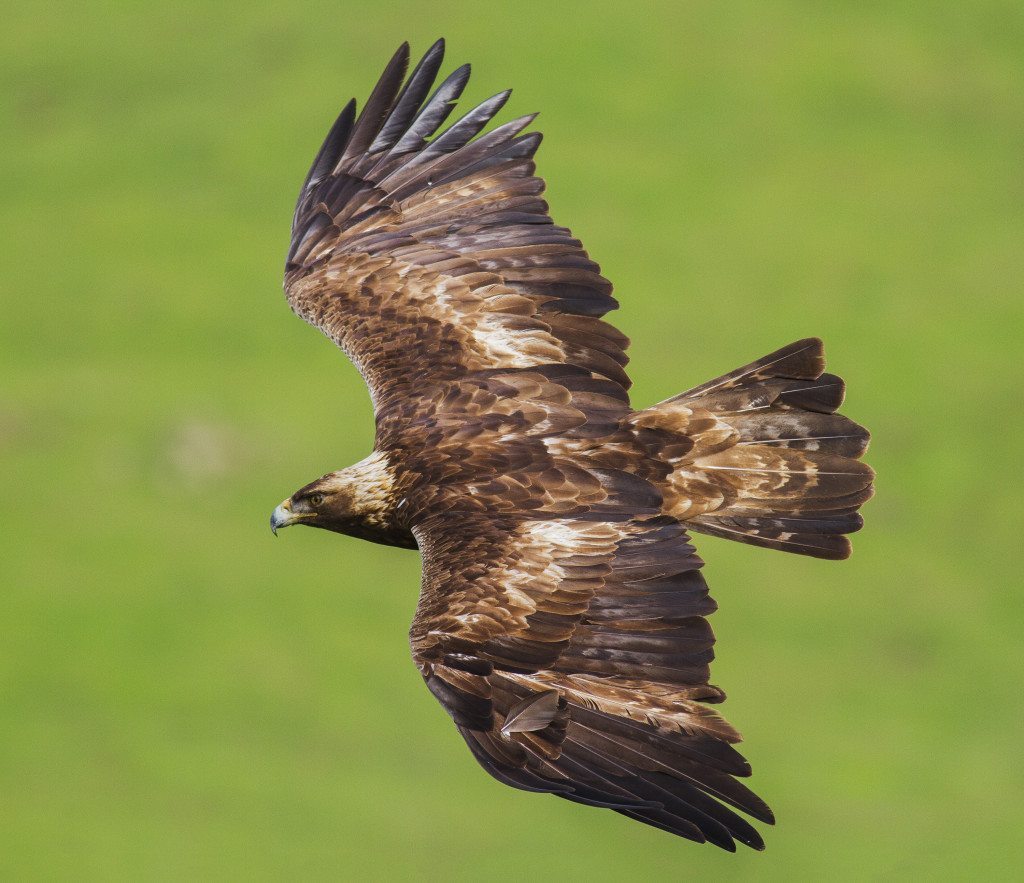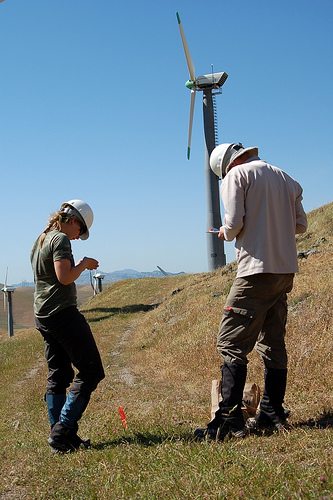Altamont Winds Inc. to shut down its Bay Area turbines
By Cindy Margulis
In a major victory for Altamont Pass birds, a wind company that has killed outrageous numbers of birds in the Altamont area announced that it is shutting down its 828-turbine wind farm, effective November 1.
Golden Gate Bird Alliance – together with other Audubon chapters and the S.F. Bay Sierra Club chapter — mounted a major campaign last spring to stop Altamont Winds Inc. (AWI) from operating because of its notorious track record. AWI killed at least 67 Golden Eagles, 80 American Kestrels, 57 Burrowing Owls, and 172 Red-tailed Hawks in a recent 10-year period.
Unashamed of the scale of the mortality it had caused, AWI pled with Alameda County to renew its operating permit for another three years. To our chagrin, we did not prevail: we lost by a heart-breaking 3:2 vote of the Board of Supervisors.
But that setback has now given way to a very significant victory.
“The reduction of avian impacts was a primary factor that influenced our decision to discontinue operating our Altamont wind farms,” AWI wrote in an email to the U.S. Fish & Wildlife Service.

More than a decade of advocacy
The roots of this welcome news about AWI go back more than a decade.
In 2004, Golden Gate Bird Alliance and other Bay Area Audubon chapters filed a lawsuit demanding that Alameda County stop allowing wind energy facilities to destroy the public’s wildlife resources. GGBA supports wind power, but believes wind farms must be built and managed in a way that doesn’t decimate bird populations.
Both Alameda County and the three other wind companies operating in the Alameda portion of Altamont Pass ultimately agreed to a settlement with us. That pivotal Settlement Agreement would spur wind firms to phase out operations of their old-fashioned turbines. Instead, they’d install fewer, more modern turbines capable of producing energy far more efficiently with much less impact on birds – a process called repowering.
As part of that Settlement Agreement, the County and operators agreed to reduce mortality at their wind farms by at least 50 percent (according to an independent monitoring regime) and develop substantive habitat conservation plans in order to help bird populations recover.
But AWI backed out of the settlement negotiations at the last minute. The company continually delayed on repowering. Instead, AWI sought multiple permit extensions over a period of years to continue operating its entire fleet of old, deadly turbines while its competitors began decommissioning theirs.
Sudden reversal
Why this sudden reversal by AWI?
Perhaps the company decided to finally focus on trying to catch up with the progress its rivals are making toward repowering. Maybe AWI executives were experiencing nagging karmic headaches from killing so much wildlife with apparent impunity? Or, perhaps other economic factors were in play: AWI’s virtually-obsolete 1980’s-era turbines have proven quite efficient at killing birds en masse, but not so efficient at generating power by today’s standards.
It’s most likely, however, that AWI simply didn’t want to pay the bill to maintain the system of wildlife monitoring required as part of the Audubon lawsuit’s settlement.
Audubon had insisted that mortality inflicted by Alameda County’s wind energy companies be monitored and measured by an independent Scientific Review Committee contracted by the county but funded by all the wind operators. That systematic attention was meant to ensure that the county and the wind farm operators could be collectively held accountable for measuring and reducing mortality by at least 50 percent.

Chance for recovery
It’s very expensive to repair cumulative damage on a landscape scale. It’s far cheaper to avoid and prevent wildlife losses than to figure out how to recover so many species’ populations after so much damage has been wrought.
Permanently turning off AWI’s old, deadly turbines — and getting them cleared off the landscape — will finally tip the balance in favor of survival for our awe-inspiring raptors and the 70+ other species of birds that rely on the Altamont Pass when nesting, wintering, or migrating.
Cumulative mortality from decades of overkilling so many species isn’t simple to overcome. However, Golden Gate Bird Alliance and our allies are committed to ensuring that the County and wind firms will work with us to facilitate wildlife population recovery. It’s vital that the region’s bird populations get an optimal opportunity to survive and, especially, to replenish their numbers in the Altamont.
AWI’s decision to shut down all its old, deadly turbines is a testament to the long-term advocacy and strategic legal action taken by Golden Gate Bird Alliance and our Bay Area Chapter partners: Ohlone Audubon, Mount Diablo Audubon, Santa Clara Audubon, and Marin Audubon.
If you were among the many people who sent an email, made a phone call, paid a visit to the Alameda County supervisors’ offices, or spoke up at hearings about AWI’s permit extension — or if you have supported Golden Gate Bird Alliance as a member or donor — you should feel justifiably proud of your impact!
Please, stick with us as we continue to monitor ongoing developments at Altamont to ensure that repowering is done responsibly… in ways that are most compatible with sustaining our local wildlife populations.
Want to learn more? Check out this excellent video by KQED about repowering in the Altamont Pass wind area. Be sure to read the article below the video: It focuses on AWI’s decision to shut down its deadly fleet.
